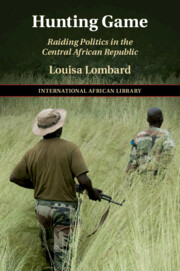Book contents
- Hunting Game
- The International African Library
- Hunting Game
- Copyright page
- Contents
- Figures
- Maps
- Acknowledgements
- Abbreviations and acronyms
- Map
- 1 Force, status, and uncertainty in the arts of acquisition
- 2 Zariba contests and collaborations
- 3 Manhunts persist in an unfortunate colony
- 4 Big-game hunting and regulatory sociality
- 5 The limits of law in coercive conservation
- 6 Camouflage skills
- 7 Denunciation and liberty
- 8 Force and status in rebellion
- 9 Sovereignty and distribution amid forceful acquisition
- References
- Index
- Titles in the series
1 - Force, status, and uncertainty in the arts of acquisition
Published online by Cambridge University Press: 20 April 2020
- Hunting Game
- The International African Library
- Hunting Game
- Copyright page
- Contents
- Figures
- Maps
- Acknowledgements
- Abbreviations and acronyms
- Map
- 1 Force, status, and uncertainty in the arts of acquisition
- 2 Zariba contests and collaborations
- 3 Manhunts persist in an unfortunate colony
- 4 Big-game hunting and regulatory sociality
- 5 The limits of law in coercive conservation
- 6 Camouflage skills
- 7 Denunciation and liberty
- 8 Force and status in rebellion
- 9 Sovereignty and distribution amid forceful acquisition
- References
- Index
- Titles in the series
Summary
North-eastern Central African Republic, a vast space bordering Chad, Darfur, and South Sudan, is a quintessential ‘stateless’ space: the government has little presence and a variety of armed actors operate. This book investigates raiding, the distinctive political repertoire that people have developed to work here, tracking the evolution of raiding skills and encounters over the last 150 years, from the period of the trans-Saharan slave trade to colonial forced labour regimes, to big-game hunting and coercive conservation, and to rebellion. Raiding is a mode of forceful acquisition that flourishes when people’s status in relation to each other is unclear, and those pursuing it develop improvised skills including camouflage, displaying force, and denouncing, generally to make claims to extraction and liberty. Raiding has been particularly important in encounters between people who were unfamiliar with each other and potentially dangerous to each other, and who are working in a place where infrastructure and institutions offer little in the way of a guide to action. Instead, people must situationally manage the conflicts of values they inevitably experience, and ethical relations are marked by negotiation and confrontation, rather than a quest for consistency. While the book’s heart beats in Central Africa, raiding politics offer rich comparative insights that helps us better understand the vibrant, if not always salutary, place that forceful acquisition plays in the world today – in Central Africa and far beyond.
- Type
- Chapter
- Information
- Hunting GameRaiding Politics in the Central African Republic, pp. 1 - 39Publisher: Cambridge University PressPrint publication year: 2020

